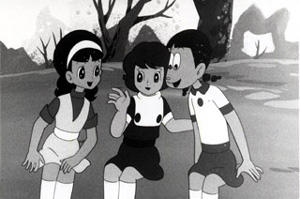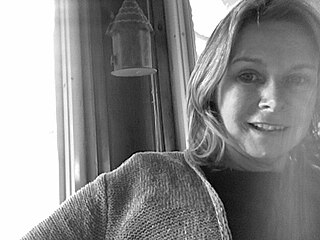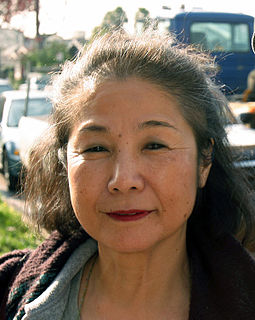Related Research Articles
Irene Ayako Uchida, was a Canadian scientist and Down syndrome researcher.

Sally the Witch, also known as Sunny the Witch, is one of the popular anime magical girls of what would eventually become a genre in Japan. Due to its characteristics, it may be considered the first shōjo anime as well; while titles such as Himitsu no Akko-chan predate Sally in manga form, the Sally anime predates Himitsu no Akko-chan's, which came out in 1969.

Michiko Kakutani is an American literary critic and former chief book critic for The New York Times. Her awards include a Pulitzer Prize for Criticism.

Yoshiko Yamaguchi was a Japanese actress and singer, born in China, who made a career in China, Hong Kong, Japan and the United States.
Yoshiko Uchida was an award-winning Japanese American writer.

The Topaz War Relocation Center, also known as the Central Utah Relocation Center (Topaz) and briefly as the Abraham Relocation Center, was an American concentration camp which housed Americans of Japanese descent and immigrants who had come to the United States from Japan, called Nikkei. President Franklin Roosevelt signed Executive Order 9066 in February 1942, ordering people of Japanese ancestry to be incarcerated in what were euphemistically called, "relocation centers" like Topaz during World War II. Most of the people incarcerated at Topaz came from the Tanforan Assembly Center and previously lived in the San Francisco Bay Area. The camp was opened in September 1942 and closed in October 1945.

Allen Say is a Japanese-American writer and illustrator. He is best known for Grandfather's Journey, a children's picture book detailing his grandfather's voyage from Japan to the United States and back again, which won the 1994 Caldecott Medal for illustration. This story is autobiographical and relates to Say's constant moving during his childhood. His work mainly focuses on Japanese and Japanese American characters and their stories, and several works have autobiographical elements.
Yoshiko Sembon is a Japanese screenwriter and director.

Suzanne Weyn is an American author. She primarily writes children's and young adult science fiction and fantasy novels and has written over fifty novels and short stories. She is best known for The Bar Code Tattoo, The Bar Code Rebellion and The Bar Code Prophecy. The Bar Code Tattoo has been translated into German, and in 2007 was nominated for the Jugendliteraturpreis for youth literature given by the German government. It was a 2007 Nevada Library nominee for Young Adult literature and American Library Association 2005 Quick Pick for Reluctant Young Adult Readers.
Yoshiko Chuma is a dancer, a choreographer and the director of the Bessie Award winning performance art group The School of Hard Knocks. Described in 2007 by Bloomberg as "a fixture on New York's downtown scene for over a quarter- century", her work spans from early "absurdist gaiety" to more recent serious reflection, which nevertheless represents the "maverick imagination and crazy-quilt multimedia work" for which the artist is known. Dance commentators have found her work difficult to classify; in a 2006 profile, Dance Magazine speculated that "One might call her a postmodern choreographer, a movement designer, or a visual artist whose primary medium is human beings--dancers, musicians, pedestrians". Chuma favors abstract art and discourages efforts to interpret her work, telling Bloomberg that "What I do is ambiguous. I don't have a statement. If I had a statement, I'd be a writer". In 2007, Chuma received a Bessie Award honoring her sustained achievements as a choreographer.
Uchida is a Japanese surname. Notable people with the surname include:

Kirin Kiki was a Japanese actress for Japanese cinema and television.
Taburakashi: Daikō Joyūgyō Maki is a 2012 Japanese television drama series.

Yurikuma Arashi is a Japanese yuri anime television series produced by Silver Link and directed by Kunihiko Ikuhara. The series was first announced via a website in August 2012, where it was referred to as the "Kunihiko Ikuhara/Penguinbear Project." The series first aired in Japan between January 5, 2015 and March 30, 2015 and is licensed in North America by Funimation. A manga adaptation illustrated by Akiko Morishima was serialized in Gentosha's Comic Birz magazine between February 2014 and April 2016 and has been licensed in English by Tokyopop under the title Yuri Bear Storm. The name appears to be a reference to Akira Yoshimura's novelization of the Sankebetsu brown bear incident, The Bear Storm, though any more concrete link besides the presence of human-attacking bears is only speculated.

Aho-Girl is a Japanese four-panel slice-of-life comedy manga series written and illustrated by Hiroyuki. It was originally serialized in Weekly Shōnen Magazine on November 28, 2012. and then moved to Bessatsu Shonen Magazine where it was serialized between July 2015 and December 2017. Twelve compilation volumes by Kodansha have been released. An anime television series adaptation by Diomedéa aired between July and September 2017.

Yoshiko Iwamoto Wada is a Japanese textile artist, curator, researcher and author.
Toto Neechan (とと姉ちゃん) is a Japanese television drama series and the 94th asadora on NHK. It premiered on April 4, 2016, and ended on October 1, 2016. The theme song is "Hanataba o Kimi ni" by Hikaru Utada.
Ri Kōran is a two-part historical and biographical film portraying the turbulent life and times of legendary pan-Asian singer and actress Ri Koran. A tragic figure pitted into the limelight of fame by the unpredictable forces of history, Ri is caught between competing nationalisms and political conflicts, her life and career sculpted by the turbulence of war and global power shifts. Loosely based on Otaka's memoir Ri Kouran wo Ikite: Watashi no Rirekisho, the two-episode film production was directed by Horikawa Tonko and starred Ueto Aya as Ri Koran, first broadcasting in Japan by TV Tokyo on February 11 and 12, 2007. Subtitled versions were subsequently made available online to pan-Asian audiences on major Asian video sharing platforms.
Yoshiko Shigekane was a Japanese writer from Hokkaido. She won the Akutagawa Prize in 1979, and her work has been adapted for film.

The Helpful Fox Senko-san is a Japanese comedy manga series by Rimukoro. It has been serialized online via Kadokawa Shoten's Comic Newtype website since October 2017 and has been collected in seven tankōbon volumes. An anime television series adaptation by Doga Kobo aired from April 10 to June 26, 2019.
References
- 1 2 Adamson, Lynda G. (1998). Literature Connections to American History, K-6: Resources to Enhance and Entice. ABC-CLIO. p. 437. ISBN 978-1-56308-502-4.
- ↑ "The Invisible Thread by Yoshiko Uchida | Scholastic". www.scholastic.com. Retrieved 27 April 2020.
| This article about a biographical book on writers or poets is a stub. You can help Wikipedia by expanding it. |
| This Asian American–related article is a stub. You can help Wikipedia by expanding it. |